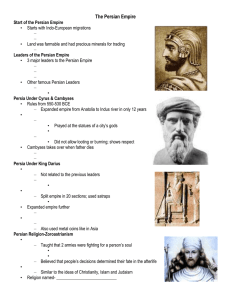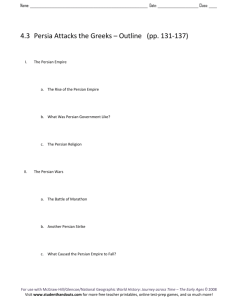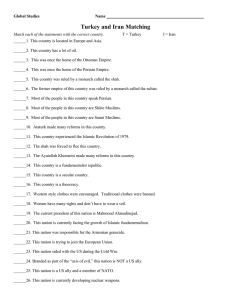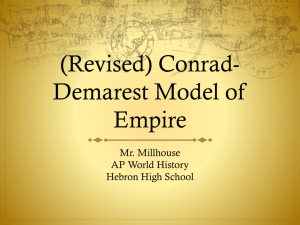Greece and Iran 1000-30 BCE Outline
advertisement
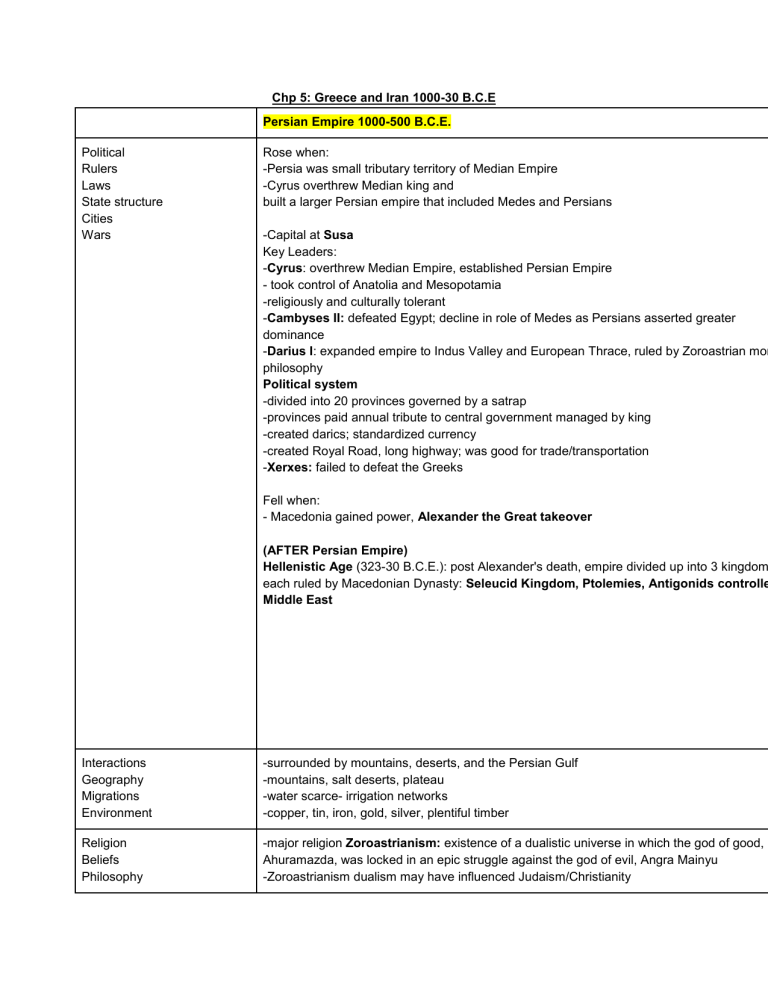
Chp 5: Greece and Iran 1000-30 B.C.E Persian Empire 1000-500 B.C.E. Political Rulers Laws State structure Cities Wars Rose when: -Persia was small tributary territory of Median Empire -Cyrus overthrew Median king and built a larger Persian empire that included Medes and Persians -Capital at Susa Key Leaders: -Cyrus: overthrew Median Empire, established Persian Empire - took control of Anatolia and Mesopotamia -religiously and culturally tolerant -Cambyses II: defeated Egypt; decline in role of Medes as Persians asserted greater dominance -Darius I: expanded empire to Indus Valley and European Thrace, ruled by Zoroastrian mor philosophy Political system -divided into 20 provinces governed by a satrap -provinces paid annual tribute to central government managed by king -created darics; standardized currency -created Royal Road, long highway; was good for trade/transportation -Xerxes: failed to defeat the Greeks Fell when: - Macedonia gained power, Alexander the Great takeover (AFTER Persian Empire) Hellenistic Age (323-30 B.C.E.): post Alexander's death, empire divided up into 3 kingdom each ruled by Macedonian Dynasty: Seleucid Kingdom, Ptolemies, Antigonids controlle Middle East Interactions Geography Migrations Environment -surrounded by mountains, deserts, and the Persian Gulf -mountains, salt deserts, plateau -water scarce- irrigation networks -copper, tin, iron, gold, silver, plentiful timber Religion Beliefs Philosophy -major religion Zoroastrianism: existence of a dualistic universe in which the god of good, Ahuramazda, was locked in an epic struggle against the god of evil, Angra Mainyu -Zoroastrianism dualism may have influenced Judaism/Christianity New Ideas/ Shifts in Thinking -believed to be created by Zoroaster Arts Literature Culture Writing Technology Intellectual Innovations Industries Economy Military Trade Commerce Money -Macedonia gained power, Alexander the Great takeover: -King Philip of Macedonia strengthened army with technology and more soldiers -Philip's son and heir Alexander (the Great) invaded Persia, defeated forces of the Persian Empire -Alexander built empire in which he maintained the administrative apparatus of the Persian Empire, used Persian officials as well as Greeks and Macedonians, and began to present himself as a successor to the Persian king Society Social classes Gender roles Lifestyle -male-dominant society, but elite women had some political influence Discussion Questions From Chp 5 Outline 1. Compare the political systems of the Persian Empire and of Greece. What factors best explain the differences between Persian and Greek political culture? ● Persian Empire always a monarchy, Greece ● City-states were self-governing, provinces answered to strong central government 2. How and why did the government of Greek city-states develop and change from the Archaic through the Classical periods? 3. Why did the Persians and the Greeks come into conflict? What factors might explain the outcome of the Persian Wars and Alexander’s conquest of the Persian Empire? 4. What role did environment and geography play in the political development of Greece as a whole? What did these factors mean for the political, social and cultural evolution of Athens and Sparta in particular? 5. How would you describe and explain the influence of the Persians and of the Greeks on western Asia and Egypt? 6. In what ways could one describe the Hellenistic world as a ‘cosmopolitan” one?
